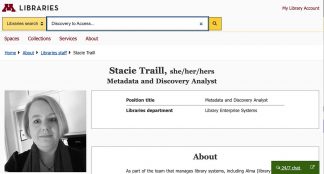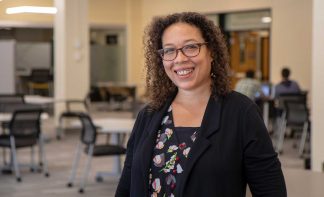By Allison Campbell-Jensen
Possible tweaks, upgrades, and improvements in Libraries search are discussed regularly by the Libraries’ Discovery to Access Steering Committee as a way to improve the user experience. Recent updates have included:
- establishing Featured Collections
- incorporating UMedia, and
- replacing offensive language in subject headings
Co-chairing this 15-person group are Malaika Grant, Librarian for English and American Literature, African and African American Studies, Cultural Studies and Comparative Literature, and Stacie Traill, Metadata and Discovery Analyst, Library Enterprise Systems.
Grant and Traill’s differing perspectives — along with those of the other Steering Committee members — allows for “a more holistic picture of our discovery needs and what we can do,” Traill says.
Working with faculty and students regularly, Grant is focused on user needs for search and discovery. Traill’s role is to “turn what we want for users into reality by working on the technical side of things behind the scenes with the other folks in the Libraries Enterprise Systems department.”
Linking public services and technical aspects in one group dedicated to and negotiating about improving search and discovery for all users is working very well, Grant says.
The impact of their work is huge. Since 2018, the number of searches across the system range from 150,000 to 400,000 a month.
Constantly realigning
The top priority for the Steering Committee is helping those search users — but which ones?
“We have expert users who are very sure what they are looking for and we have new users who have never used the site at all before,” Grant says. Some may have never previously used a library catalog and may be unsure how to approach it.
“We’re trying to serve all those audiences at the same time. A lot of times, when we are struggling with a decision, that’s why,” Grant Says “We’re always trying to find that compromise, and If we can’t find it, we’re leaning toward those new users, who have little idea of what they’re doing.”
Then they seek to help advanced users in other ways, such as through the testing of Search. But, importantly, each person on the Steering Committee represents their users and their units in reporting feedback.
“We try to keep avenues open for constant feedback and refinement as much as we can,” Traill says (those who wish to report a specific problem can send an email to almaprim@umn.edu).
The committee also hears from staff who teach undergraduates, such as Kate Peterson, Undergraduate Services Librarian. Grant says of Peterson: “She’s great about saying ‘This term you’re using? No one knows what it means.’” Then discussions begin on what would be a better word.
On the technical side, the Steering Committee receives potential changes to the software systems that undergird Libraries search on a monthly basis.
“There is this constant cycle of features and bug fixes that we have to review and decide if they are helpful to users,” Traill says. “If we do want to use it, what do we need to do to make it work in our implementation context? Sometimes these are not easy questions. Sometimes adding more and more features, if they are not helpful, can make the system worse.”
At other times, Grant notes, the software vendor’s changes make something on their wish list possible.
The Steering Committee also, when looking at possible changes, keeps an eye out for other issues, such as privacy.
“We tend to be pretty cautious about that,” Traill says. “If something has the potential to make us less secure, or maybe compromises private user data in a way that we wouldn’t want, we will often take a step back and say we don’t need to implement that.”
Featured collections
One recent approach to improving accessibility and discovery is the addition of Featured Collections.
“I’m so happy to have the popular reading collections highlighted online,” Grant says. “To have the book covers there makes them look so appealing as well as making them accessible for browsing.”
Currently, the Kirschner Cookbook Collection and the Ames Library Books on Colonial India also are highlighted online in this new format. Each Featured Collection has its own embedded search function, so users can efficiently find what they want. Grant looks forward to featuring other collections in the future.
UMedia
UMedia provides open access to digitized materials from across the University of Minnesota. Although the search menu on the Libraries website includes UMedia as a dropdown choice, users no longer need to know whether materials are digitized and in UMedia to find them. Since August, those materials can be found through the general Libraries search because of work with the software vendor and technical work on the part of the Libraries.
“UMedia is a wonderful gateway to all the things we’ve digitized from our collections,” Traill says, and now it’s easier to find. A goal for the Steering Committee, she adds, “is to incorporate as many of our important repositories and resources as we can into Libraries search so it can be that big front door.”
Addressing offensive language in search
Among the recent improvements in search is addressing offensive language, Grant says. In April of this year, the Steering Committee instituted a change in search subject headings from “aliens” and “illegal aliens” respectively to “noncitizens” and “unauthorized immigrants.” The Library of Congress, upon which the Libraries depend for subject headings, had discussed this change in 2016.
“But before changes could be put in place, the House of Representatives objected,” the Steering Committee reported. “In the face of publicity and political pressure, the Library of Congress opted to continue using the pejorative terminology, and has not yet revisited that decision.” Says Grant: “This has been a long road for libraries — not just us — to get this offensive language changed.” The result is a more inclusive search.
Looking ahead
The Discovery to Access Steering Committee will continue fine-tuning Libraries Search, with the understanding of both patrons’ and technical issues, to best serve users.
“It’s a great collaboration,” says Traill. She finds it rewarding to use her back-office knowledge in working with her colleagues, to help increase understanding of what’s possible and learning what further improvements might be desired.
With the recent revamping of the Libraries website, Libraries search is aligned at the top of every webpage. “The search itself is more discoverable; the search is everywhere,” Grant says. “The function of it hasn’t changed very much, but the front door to it has changed.”
Traill is excited to see if this makes a difference in search traffic: “It’s a big step forward, I think.”





